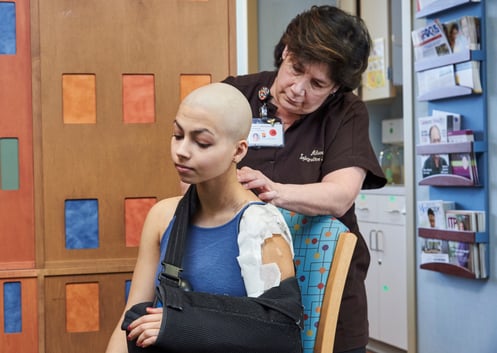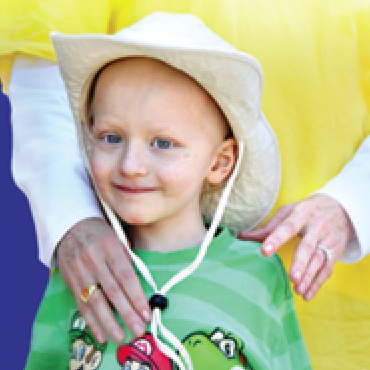
There are so many new words and phrases that a family must learn when they begin a journey through pediatric cancer or blood disorders and it can be difficult to keep track of what they all mean. In the coming months we will try to explain what some of these concepts and practices are and hope it can help make this process just a little bit easier.
We are starting with a discipline that encompasses many tools and practices under one umbrella. Continue reading to learn why integrative medicine can make a difference when battling pediatric cancer or blood disorders.
The simplest explanation of integrative medicine can be found in the Oxford English Dictionary:
"A form of medical therapy that combines practices and treatments from alternative medicine with conventional medicine."

The defining principles of integrative medicine are:
- The patient and practitioner are partners in the healing process.
- All factors that influence health, wellness, and disease are taken into consideration, including body, mind, spirit and community.
- Providers use all healing sciences to facilitate the body’s innate healing response.
- Effective interventions that are natural and less invasive are used whenever possible.
- Good medicine is based in good science. It is inquiry driven and open to new paradigms.
- Alongside the concept of treatment, the broader concepts of health promotion and the prevention of illness are paramount.
- The care is personalized to best address the individual’s unique conditions, needs and circumstances. Practitioners of integrative medicine exemplify its principles and commit themselves to self-exploration and self-development.

As anyone who has been treated by a Valerie Fund Center can tell you, the second principle of integrative medicine is paramount in The Valerie Fund's mission statement. Caring for the body, mind, spirit, and community is our main goal which is why we use integrative medicine in many of our Valerie Fund Centers.
Integrative Medicine for Cancer
Sometimes referred to as "integrative oncology," the idea and the principles are the same: Treat the whole patient, not just the disease. For cancer patients especially, that includes ways to ease stress and worry and boost your sense of well-being. You might try:
- Acupuncture: A practitioner inserts thin needles into the patient's skin at certain points on your body.
- Exercise programs: It should include aerobic activity like walking or swimming, strength training, and flexibility exercises.
- Massage: A therapist rubs or kneads the patient's muscles.
- Meditation: The patient focuses all of their thoughts on a single word -- or nothing at all.
- Nutrition counseling: A registered dietitian helps the patient manage weight changes and nausea.
- Yoga: This mix of physical poses and meditation can help the patient relax.

Integrative Medicine for Blood Disorders
When dealing with many blood disorders, the first and foremost issue to deal with can be pain management. This becomes even more of a priority when the blood disorder becomes a chronic condition and treatment must be integrated into the patient's life. Integrative medicine can play a key role since one of its objectives is to be as non-invasive as possible.
The goal here is to incorporate integrative medicine techniques into a patient's daily life to help manage pain and stress. These alternatives used in conjunction with medication can make it easier for children dealing with blood disorders to feel better and manage their pain in a safer and more consistent way. Many of the integrative medicine practices also have the added benefit of easing stress and teaching the patient how to live a more balanced life. This all-encompassing wellness is the ultimate goal of integrative medicine.

Further Resources
You can click here to learn more about using integrative medicine when battling pediatric cancer and blood disorders. As when dealing with any medical topic, please be sure to consult your professional medical team before taking any action. You can find contact information for our Valerie Fund Centers by clicking here.
Information for this article was provided by the following:
WebMD, Duke University Health, and The Mayo Clinic

After their nine-year-old daughter Valerie succumbed to cancer in 1976, Sue and Ed Goldstein were determined that no family should have to travel great distances to receive state-of-the-art medical care. Today, more than 6,000 children with cancer and blood disorders benefit immeasurably by receiving their medical treatment close to home in a child-centered environment. The Valerie Fund ensures they do not have to rely on insurance reimbursements to receive a range of customized therapeutic services that enhance their quality of life. For more information, please visit www.thevaleriefund.org.









